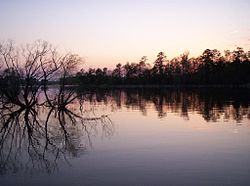Lake Murray (South Carolina)
| Lake Murray | |
|---|---|

Western side
|
|
| Location | Lexington / Newberry / Saluda / Richland counties, South Carolina, United States |
| Coordinates | 34°03′57″N 81°19′44″W / 34.065795°N 81.328968°WCoordinates: 34°03′57″N 81°19′44″W / 34.065795°N 81.328968°W |
| Type | Reservoir |
| Primary inflows | Saluda River |
| Primary outflows | Saluda River |
| Basin countries | United States |
| Max. length | 41 mi (66 km) |
| Max. width | 14 mi (23 km) |
| Surface area | 50,000 acres (200 km2) |
| Max. depth | 200 ft (61 m) |
| Shore length1 | 450 mi (724 km) |
| Surface elevation | 360 ft (110 m) |
| 1 Shore length is not a well-defined measure. | |
Lake Murray is a reservoir in the U.S. state of South Carolina. It is approximately 50,000 acres (200 km²) in size, and has roughly 500 miles (800 km) of shoreline. It was impounded in the late 1920s to provide hydroelectric power to the state of South Carolina. Lake Murray is fed by the Saluda River, which flows from upstate South Carolina near the North Carolina state line. The Saluda Dam (officially the Dreher Shoals Dam) was an engineering feat at the time of its construction. The dam, using the native red clay soil and bedrock, was the largest earthen dam in the world when it was completed in 1930. Lake Murray itself is named after the project's chief engineer, William S. Murray. The Saluda Dam is approximately 1.5 miles (2.4 km) long and 220 feet (67 m) high. Lake Murray is 41 miles (66 km) long, and 14 miles (23 km) wide at its widest point. At the time when the lake was finished, it was the world's largest man-made reservoir.
Since its construction, Lake Murray has been the focal point of the region. Many different communities in four counties are all tied to the lake, and the local history has as much to do with the lake as the lake has to do with the local history. Considering Lake Murray now covers an area that was once populated, the story of what lies beneath its surface is the story of Lake Murray itself.
In addition to serving as a source of hydroelectric power for the region, the lake has become a recreational attraction, with fishing and boating being popular activities. Also, Dreher Island State Recreation Area, located in the Western part of the lake, provides multiple activities—all focused on the lake.
The Saluda River was named after the Saluda Indian tribe, which lived along the banks of the river. For reasons unclear, the Saluda tribe migrated to Pennsylvania beginning in the early 18th century and were replaced by Cherokee from the north.
...
Wikipedia
